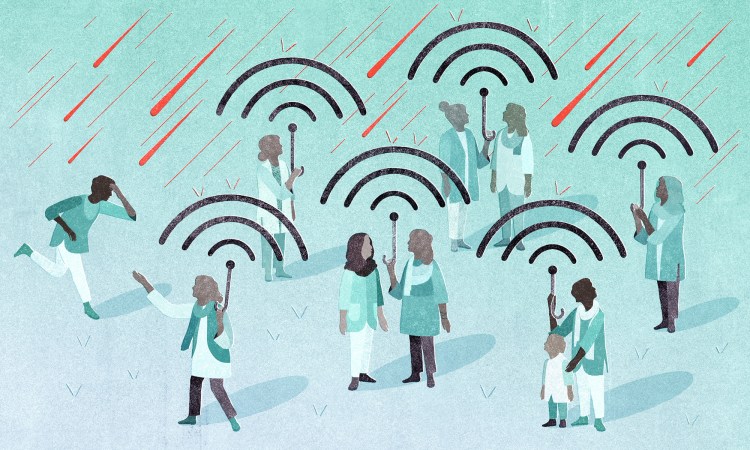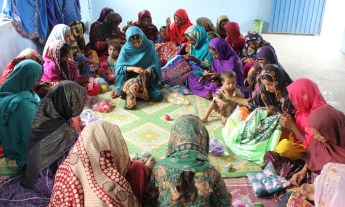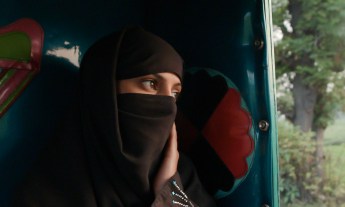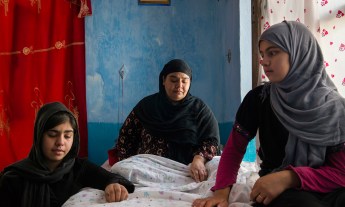
Lawyer and activist Nighat Dad talks about the fight to create a more accessible internet for women and other marginalized groups in her home country of Pakistan.
There had never been a woman like Qandeel Baloch in Pakistan. In 2013, when she was 23 years old, her dramatic audition on Pakistan Idol went viral, and in the years that followed, she became an Internet sensation. She developed an avid following on social media for her provocative selfies and dancing videos and for criticizing and mocking powerful Pakistani politicians and clergy.
And while she was called “Pakistan’s Kim Kardashian” for her outsize social media persona, the moniker was never quite accurate. She came from a working-class family in Multan, Punjab, and Qandeel Baloch was a pseudonym she used to protect her identity from her family and neighbors. “She did something that no woman ever did in the online space here — she challenged the patriarchal norms and reclaimed her sexuality,” says Nighat Dad, a lawyer and digital rights activist in Pakistan. “She was a working-class woman, and she made her own space on the Internet when mainstream media rejected her.”
But in 2016, only weeks after her real identity was reported by the media, Baloch was found strangled to death. The next day, her brother was arrested for what he admitted was an “honor killing,” a crime that frequently goes unpunished in Pakistan. In his confession, he said, “Girls are born only to stay at home and to bring honor to the family by following family traditions, but Qandeel had never done that.”
Since her death, Baloch has become a feminist icon in Pakistan and remains a topic of national interest and debate. Last summer, a biographical soap opera about her life, Baaghi, became one of the most watched shows in the country.
“In Pakistan, the honor of the family is linked to women’s bodies and what we do,” says activist Nighat Dad. “It’s how patriarchal norms treat women in offline spaces, and the same mindset is true in the online spaces.”
Dad, a TED Fellow, sees a direct link between the “honor killing” of Baloch and the systemic cyberharassment — blackmailing, stalking, doxing, defamation — of women and other marginalized groups in Pakistan. “In the society we live in, the honor of the family is linked to women’s bodies and what we do,” she says. “It’s how patriarchal norms treat women in offline spaces, and the same mindset is true in the online spaces.”
Like Baloch, Dad is from a small village in Punjab. In 2001, when she was 20, Dad began studying law at the University of the Punjab in Lahore, where she estimates only 20 percent of her classmates were women. As a student, she was forbidden by her family from carrying a cell phone. “I wasn’t allowed by my brother because of lack of trust in me,” she says. “Back then, it was the common perception that only men need mobile phones and women have nothing to do with information and communication technologies.”
After law school, Dad married, and her then-husband gave her access to a cell phone — but, she says, “I had no privacy with my mobile device. I was not allowed to have a password. He looked at the messages and the call log. Instead of comforting me as a means of communication, the phone became a surveillance device.” Six months after the birth of their first son, they divorced.
As Dad practiced criminal and family law in Lahore, she realized there was a vital and unmet need to protect women’s digital rights in Pakistan. “For offline spaces, there were several individuals and organizations working on the violation of traditional human rights, but I noticed no attention was happening in the online space,” she remembers. “I received a few cases related to online harassment, but I didn’t know how to address them. There was no law, and I realized that so much work was needed.”
According to a report, men are twice as likely as women to own a mobile phone in Pakistan, among the highest gender gaps in phone usage in the world.
In 2012, Dad founded the Digital Rights Foundation (DRF), a nonprofit organization that defends online freedom for women and other vulnerable communities in Pakistan. DRF works to strengthen the online rights of women, activists, journalists and human rights defenders by offering digital security training and workshops, advocating for policies, and researching online violence.
Dad and her team at DRF imagine a future where the Internet is equal for all — sometimes referred to as the “feminist” Internet. “To me, a ‘feminist’ Internet is an Internet which is accessible to everyone, where everyone has agency over their expression and their right to access information,” Dad says. “At the same time, it is compassionate and empathetic to the people sitting behind the screens. It also provides access to economic opportunities.”
Dad believes that the Internet has the potential to be a space that empowers women, helping them connect to each other and to new outlets of expression. “Women should have equal access to technology, especially in conservative cultures like ours, because we do not find the same free spaces in the public sphere,” she says. “Not every woman can go outside of their house. Not every woman can enjoy the right to free speech or access to information — but technology can give them that freedom.” Women in Pakistan with Internet access could start small businesses from home, earning incomes and gaining autonomy.
Pakistan’s profoundly conservative patriarchal culture makes Dad’s fight for women’s digital rights a unique challenge. A recent UN report paints a dismal picture of gender equality in the country, which accepts few roles for women beyond wife and mother. Even though women make up 51 percent of the population in Pakistan, only 22.7 percent of them are part of the labor force. Many women in the country, especially in rural areas, are prohibited by their families from accessing the Internet or using a mobile phone. In fact, according to a 2016 UN report, men are twice as likely as women to own a mobile phone in Pakistan, among the highest gender gaps in phone usage in the world.
“Pakistan is a country with so many laws, but when it comes to implementation, nothing happens,” says Nighat Dad. “My focus, as a feminist, is seeing how I can address the issue on the ground by education.”
Even after women get online, too often cyberharassment makes them log off. In 2016, DRF surveyed 1,400 women in Pakistan and found that 70 percent were afraid that their pictures will be posted online without their permission, and 40 percent had been stalked or harassed through messaging apps. Dad points out that cyberharassment is deeply connected to real-life violence: “Online and offline spaces resonate each other and complement each other.”
In 2016, in an apparent attempt to address the problems of cyberterrorism and cyberharassment, Pakistan passed the controversial Prevention of Electronic Crimes Act, which gave the government broad power to censor online content in order to defend national security. Like many human rights defenders, Dad does not support the law. “It was enacted in the name of protecting woman in Pakistan,” she says. “But the real intention was to criminalize political dissidents. There is a provision in the same law that gives immense power to the authorities to monitor Internet users and immense power to the telecom regulator in Pakistan to censor and ban content in the name of national security, morality or obscenity.”
While sections in the Prevention of Electronic Crimes Act prohibit blackmailing and sharing images without consent, DRF hasn’t had much success trying to enforce the laws. “Pakistan is a country with so many laws, but when it comes to implementation, nothing happens,” Dad says, citing limited resources to enforce them as well as lack of political will. “My focus, as a feminist, is not focusing on the law, but seeing how I can address the issue on the ground by education.”
DRF helps women in Pakistan understand what their rights are on the Internet. Nighat Dad says, “We tell them that this space belongs to them, not to the harasser.”
An essential part of this education is helping women in Pakistan understand what their digital rights are. DRF does so through frequent workshops and trainings, which address topics like using privacy settings on social media, making strong passwords, remaining anonymous online, and keeping electronic devices secure. In 2017 alone, DRF worked with thousands of journalists, students and human rights defenders in dozens of workshops in over 30 locations across the country. “Due to the deeply rooted patriarchy in Pakistan, the women in our society consider harassment as part of accessing spaces offline and online,” Dad says. “We tell them that this space belongs to them, not to the harasser, and show them how they can fight back.”
Pakistan needs a holistic approach to cyberharassment that works across the private and public sectors, Dad argues. “We should take a multi-stakeholder approach to this,” she says. “It should involve the government and law enforcement; it should include the private sector, like Facebook and other tech giants. It should also include academia, because we really need to use research to support our advocacy.” DRF works directly at this nexus, studying cyberharassment in Pakistan, advising lawmakers and government bodies on policies, and working directly with Facebook to escalate urgent privacy violations that could endanger a woman’s life.
Dad also believes that creating robust mechanisms for reporting harassment is key to creating safe spaces online. In December 2016, DRF launched Pakistan’s first cyberharassment helpline to provide legal advice, digital security tips and crisis counseling to victims. “Inititally, I thought we would get one or two calls in a day, but we ended up getting 20 calls per day,” she says. “There was no space where women can speak up about their issues.”
“The more you challenge people and the status quo, the more you face backlash,” says Nighat Dad. “I’m not really afraid of it. It actually proves why the work that I’m doing is much needed.”
In its first year, DRF’s helpline received over 1,500 complaints, most related to the non-consensual use of pictures, videos and personal data online, which are often used to blackmail women. Many other calls were related to impersonation online and unsolicited messages. Dad says the constant threat of blackmail often causes anxiety and depression in women. “They cry, they don’t know what to do, and they ask us, ‘If you won’t help me by this evening, I will commit suicide,’” she says. “We have a counselor who talks to them and tells them that we are dealing with this situation, there are other people who have dealt with this bravely, and you are not alone. The mental trauma is so much more than we can imagine.”
DRF has been using the anonymous data generated from the helpline calls to make policy suggestions to the Pakistani government, helping them identify gaps in the law and providing recommendations to combat these crimes. In 2018, Dad met with Pakistan’s Interior Ministry, which she successfully lobbied to allocate more resources to the Federal Investigation Agency’s cybercrime wing, to monitor and resolve cases of harassment. “If we want to give service to the victims of violence in online space, we have to work with the public bodies and tell them where they are wrong and how they can correct themselves,” she says.
Not surprisingly, Dad faces daily harassment online — trolling, shaming, slander — because of the work she does. “The more you challenge people, the more you challenge the status quo, the more you face backlash,” she says. “It’s become part of my everyday online life, and I’m not really afraid of it. It actually proves why the work that I’m doing is much needed.”
While change is slow, the condition of women in Pakistan — online and offline — is gradually improving, says Dad. “Twelve years ago when I was in university, I was not allowed to carry a mobile phone,” she recalls. “But now I see that young women in colleges, universities and schools, they have access to phones. Now I — along with my young women team members — am leading the debate on digital rights in Pakistan.”
Law student Khadija Siddiqi launched a social media campaign, posting photos of her wounds online. She showed how to use the Internet — a space that often excludes women in Pakistan — to tell her story.
As a testament to such progress, Dad tells the story of Khadija Siddiqi, a 22-year-old law school student who was stabbed 23 times by a former friend in 2016. Miraculously, Siddiqi survived and took her case to court. “There was fake news around her and a lot of character assassination of her on social media, especially by the perpetrators and their friends,” Dad says. “But she got a lot of public support on social media as well.”
Siddiqi connected with a human rights lawyer, and together they launched a social media campaign to raise the profile of her case, posting the graphic photographs of her stabbing wounds online. The images sparked a wave of support for Siddiqi, and it became a national news story. She showed how to use the Internet — a space that so often excludes women in Pakistan — to tell her own story.
“She stood her ground, and she finally won the case,” Dad says. “I talk to her sometimes, because she reached out to me for support. Somebody advised her, ‘Khadija, you should go for cosmetic surgery.’ And she said, ‘No, I want to keep these scars to remind me of my struggle and how it pushed me to broaden my struggle for other women.’ And I’m so proud of her.”















